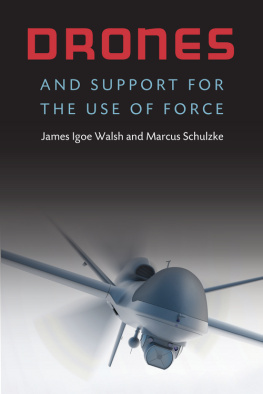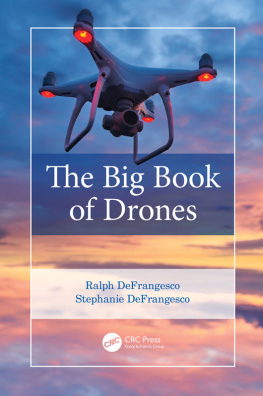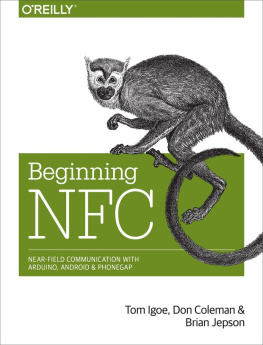James Igoe Walsh - Drones and Support for the Use of Force
Here you can read online James Igoe Walsh - Drones and Support for the Use of Force full text of the book (entire story) in english for free. Download pdf and epub, get meaning, cover and reviews about this ebook. year: 2018, publisher: The University of Michigan Press, genre: Politics. Description of the work, (preface) as well as reviews are available. Best literature library LitArk.com created for fans of good reading and offers a wide selection of genres:
Romance novel
Science fiction
Adventure
Detective
Science
History
Home and family
Prose
Art
Politics
Computer
Non-fiction
Religion
Business
Children
Humor
Choose a favorite category and find really read worthwhile books. Enjoy immersion in the world of imagination, feel the emotions of the characters or learn something new for yourself, make an fascinating discovery.
- Book:Drones and Support for the Use of Force
- Author:
- Publisher:The University of Michigan Press
- Genre:
- Year:2018
- Rating:4 / 5
- Favourites:Add to favourites
- Your mark:
- 80
- 1
- 2
- 3
- 4
- 5
Drones and Support for the Use of Force: summary, description and annotation
We offer to read an annotation, description, summary or preface (depends on what the author of the book "Drones and Support for the Use of Force" wrote himself). If you haven't found the necessary information about the book — write in the comments, we will try to find it.
Drones and Support for the Use of Force — read online for free the complete book (whole text) full work
Below is the text of the book, divided by pages. System saving the place of the last page read, allows you to conveniently read the book "Drones and Support for the Use of Force" online for free, without having to search again every time where you left off. Put a bookmark, and you can go to the page where you finished reading at any time.
Font size:
Interval:
Bookmark:
 Page i
Page i Combat drones are transforming attitudes about the use of military force. Military casualties and the costs of conflict sap public support for war and for political and military leaders. Combat drones offer an unprecedented ability to simultaneously reduce these costs by increasing accuracy, reducing the risks to civilians, and protecting military personnel from harm. These advantages should make drone strikes more popular than operations involving ground troops. Many critics contend that drone warfare will make political leaders too willing to authorize wars, which could weaken ethical and legal constraints on the use of force. Because combat drones are a relatively new phenomenon, these arguments have largely been based on anecdotes, a handful of public opinion polls, or theoretical speculation.
Drones and Support for the Use of Force utilizes experimental research to analyze the effects of combat drones on Americans support for the use of force. The authors develop expectations drawn from social science theory and then assess these conjectures using a series of survey experiments. Their findingsthat drones have had important but nuanced effects on support for the use of forcehave implications for democratic control of military action and civil-military relations, and they provide insight into how the development and proliferation of current and future military technologies influence the domestic politics of foreign policy.
James Igoe Walsh is Professor of Political Science at the University of North Carolina at Charlotte.
Marcus Schulzke is an independent scholar and was formerly a Lecturer in the Department of Politics at the University of York.
Page ii Page iiiJames Igoe Walsh and Marcus Schulzke
University of Michigan Press
Ann Arbor
Page ivCopyright 2018 by James Igoe Walsh and Marcus Schulzke
All rights reserved
This book may not be reproduced, in whole or in part, including illustrations, in any form (beyond that copying permitted by Sections 107 and 108 of the U.S. Copyright Law and except by reviewers for the public press), without written permission from the publisher.
Published in the United States of America by the
University of Michigan Press
Manufactured in the United States of America
A CIP catalog record for this book is available from the British Library.
Library of Congress Cataloging-in-Publication Data
Names: Walsh, James Igoe, author. | Schulzke, Marcus, author.
Title: Drones and support for the use of force / James Igoe Walsh and Marcus Schulzke.
Description: Ann Arbor : University of Michigan Press, [2018] | Includes bibliographical references and index. |
Identifiers: LCCN 2018023715 (print) | LCCN 2018028500 (ebook) | ISBN 9780472124299 (E-book) | ISBN 9780472131013 (hardcover : alk. paper)
Subjects: LCSH: Drone aircraftGovernment policyUnited States. | United StatesMilitary policyPublic opinion. | WarPublic opinion. | WarMoral and ethical aspects. | Drone aircraftMoral and ethical aspects. | War and societyUnited States. | United StatesPublic opinion.
Classification: LCC UG1242.D7 (ebook) | LCC UG1242.D7 W34 2018 (print) | DDC 358.4/14dc23
LC record available at https://lccn.loc.gov/2018023715
Cover illustration courtesy Jules2000/Shutterstock.com
Page vFor comments and suggestions on earlier versions of the manuscript, we thank Max Abrahms, Mary Layton Atkinson, Mia Bloom, Justin Conrad, Graeme Davies, Erik Gartzke, Aaron Hoffman, Michael Horowitz, Jenna Jordan, Sarah Kreps, Cherie Maestas, James A. Piazza, Todd Sandler, John Szmer, and Joseph Young. We are particularly grateful to Victor Asal, who introduced us and encouraged us to collaborate on this book, as well as two anonymous reviewers whose suggestions led to a much-improved final product. We presented parts of the work at the annual meetings of the American Political Science Association, the Military Operations and Law Conference, Tufts University, the University of St. Gallen, the Middlebury Institute for International Studies, and the Pennsylvania State University, and we thank participants for their input. At the University of Michigan Press, Danielle Coty, Elizabeth Demers, and Scott Ham provided important suggestions and guided the manuscript to publication.
Financial support was provided by the University of York and the University of North Carolina at Charlotte. Samantha Luks and Marissa Shih at YouGov ably implemented the experiments, which were approved by the Institutional Review Board at the University of North Carolina at Charlotte. Replication code and data can be found at http://www.jamesigoewalsh.com
Page viii Page 1Political leaders face two key challenges when they decide to use military force: winning the war itself, and winning support at home. In the past two decades, the United States has pursued a technological solution to these problems by developing combat dronesweapons that can both selectively target opponents and minimize the costs and risks of combat. In this book, we seek to understand how this solution to the challenge of military victory also addresses the need for public support for engaging in conflict.
Combat drones have been employed by the United States against insurgent and terrorist groups. These militant organizations are materially weaker than the governments they fight. Their relative weakness leads them to avoid direct military confrontations and to use the civilian population to mask their identities, attempting to pass as noncombatants by eschewing uniforms and by residing in populated areas. A key challenge that authorities face in countering insurgencies is solving this identification problem of distinguishing bona fide militants from civilians.
Page 2 The United States faced just this problem in its attempts to counter insurgencies in Vietnam, Iraq, and Afghanistan. In Vietnam, areas subject to aerial bombing experienced many civilian casualties and saw declines in government control and increases in influence by militants. In Iraq, inadvertent killings of civilians by the United States led to more militant violence in regions where government influence and support was the weakest. In Afghanistan, popular support for the international military coalition led by the United States declined in villages where its use of force resulted in civilian harm.
Leaders in democracies also need to maintain domestic political support for the conflict by convincing the public that the benefits and likelihood of eventual victory will exceed the human and financial costs. Their ability to do so depends in part on success on the battlefield, but it is difficult to demonstrate with much certainty that counterinsurgency campaigns are working. Militant movements present few opportunities to decisively defeat the enemy in set-piece battles, and the militants ability to hide among the population makes it difficult to assess their military capabilities. Even when militants lose major engagements, as they did during the Tet Offensive in Vietnam and the Battles of Fallujah in Iraq, the outcome rarely feels like a victory because the confrontations provide evidence of militants strength and foster doubts about whether long-term political objectives can be met. Citizens can clearly see the costs of using force against militantsgovernment spending and military casualties, for examplebut have difficulty seeing any successes. Mounting financial and human costs, especially military casualties, directly reduce support for countering insurgencies. Vietnam, Iraq, and Afghanistan illustrate this dynamic; in each case, public support for the use of force declined as casualties increased.
Font size:
Interval:
Bookmark:
Similar books «Drones and Support for the Use of Force»
Look at similar books to Drones and Support for the Use of Force. We have selected literature similar in name and meaning in the hope of providing readers with more options to find new, interesting, not yet read works.
Discussion, reviews of the book Drones and Support for the Use of Force and just readers' own opinions. Leave your comments, write what you think about the work, its meaning or the main characters. Specify what exactly you liked and what you didn't like, and why you think so.











